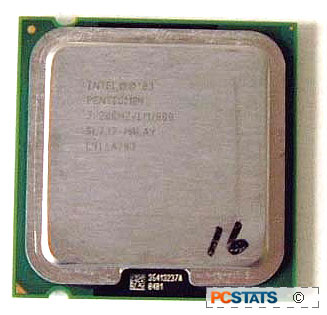Until
recently, Intel had steadfastly used speed (in MHz and GHz) to name the various
models in its processor lines. This used to be the rule for all processor
manufacturers, since the computer buying public was used to the equation (faster
processor name) = (faster computer).
 AMD ditched this train of thought in 2001 when the company introduced
the Athlon XP+ line of processors. Instead of identifying these chips by
figures in GHz, AMD slapped on a 'Performance Rating' number which was intended
to indicate the processors' relative performance as compared to an older line of Athlon CPUs.
AMD ditched this train of thought in 2001 when the company introduced
the Athlon XP+ line of processors. Instead of identifying these chips by
figures in GHz, AMD slapped on a 'Performance Rating' number which was intended
to indicate the processors' relative performance as compared to an older line of Athlon CPUs.
This system was adopted since the XP+ line had
considerably lower clock speeds than comparable Intel Pentium 4 processors. In
all cases, the AthlonXP processors were comparable or superior in performance
despite a dramatic difference in GHz figures between competing AMD and Intel
CPUs. AMD reasoned correctly that the majority of the buying public would always
choose the processor with the fastest sounding name, so the PR naming scheme
(1800+, 3200+, etc.) was born and still lives on in the Athlon 64 processor
line.
With the move to socket 775, Intel has also rebranded its Pentium
4 processors which were otherwise hitting the upper limits in terms of speed. The reason,
as AMD figured out a while ago, is that users will not keep upgrading
if the processors' names do not reflect a speed increase. The concept
of ever increasing gigahertz values and computer speed being linked together is still firmly in the minds of
consumers.... just like a 2006 Ford car just has to be 'better'
than a 2005 Ford.
By switching to
model names that are not related to speed, Intel has bought itself time to
tinker with the processor lines. One upcoming change is the moving of
Pentium M processor variants to the desktop. As these are much lower speed in
terms of GHz speed (while performing equivalent work), this naming change makes sense
for the future.
The new
Intel naming scheme works like this:
Intel
Pentium 4 processor 5xx = Pentium 4 processors with hyperthreading, 800Mhz FSB
and 1MB of level 2 cache memory. The last two digits indicate speed. For example: 520 = 2.8GHz,
530 = 3.0 GHZ, 540 = 3.2GHz, etc.
Intel
Celeron D processors 3xx = Celeron processors at 533Mhz FSB with 256K L2 cache
memory. The last two
digits indicate speed: 320 = 2.4 GHz, 325 = 2.53GHz, 330 = 2.66GHz,
etc.
Intel
Pentium 4 M processor 7xx = Pentium 4 M processor with 2MB of Level 2 cache
memory and 400MHz FSB. The last two digits indicate speed: 715 = 1.50GHz, 725 =
1.60GHz, 735 = 1.70GHz, etc.
